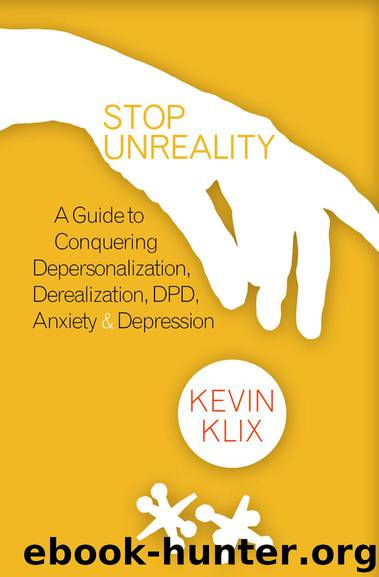Stop Unreality: A Guide to Conquering Depersonalization, Derealization, DPD, Anxiety & Depression by Kevin Klix

Author:Kevin Klix
Language: eng
Format: mobi
Tags: Mental Health, Psychology, Health & Well Being, Self Help, Nonfiction, Depression
ISBN: 9781519972101
Publisher: Klix Artwork Ltd.
Published: 2015-11-12T22:00:00+00:00
As you can see, it appears that around our late-teens and twenties is when DP/DR tends to spark. Why do you feel that is? This is all speculation, you see, but it appears that when we reach these ages, we tend to experiment with drugs and tend to find out what we are sensitive to, what we can handle, and what amounts of the drugs we like.
If left untreated DP/DR could stay for quite a few years. This graph shows people that have experienced it with and without correct professional treatment, on average, and recovered. Those numbers are where the decline shows. This is scary, obviously, but it inclined me to believe that the reason people say they are, for example, “90% better,” and not 100%, tells me that DP/DR can linger in the mind after experiencing it. That does not necessarily mean that you “have it” forever, it just means that you are still a bit “freaked out” by it once going through an improvement in your DP/DR. It is possible that is purely psychological in nature, but obviously cannot be proven entirely because of the varieties of people’s specific cases.
Going into high school or early-adulthood can be a very confusing and stressful time in our lives. It can appear to be a time-sensitive transition because we have these pressures around us to be the best we can be, do the things we want, accomplish the things we want, and we have to choose things wisely, we are told. This can make anyone feel on-edge because the idea is that if you want A you have to do B, but often, what happens is during those transitions we don’t actually know what are A is, so we are doing a bunch of B’s for seemingly no reason, in our perspectives.
In a way this can make us feel “robotic” because we are doing things as a duty and not with a conscious effort. This can be tough and draining for anyone, and it’s not far-fetched to completely know your true sense of Self later on in life, in our early- to late-thirties or -forties. Interesting enough, those are the years when people commonly claim that the have found their “dream job,” or “purpose,” in life. Can this make you think that you’re not alone? I’m hoping that can make you find some comfort in knowing these hints on life. The idea of purpose can be hard for us to accept, but again, life is about experience and growth, not having everything be given to us easily. If it was easy, we would have no real sense of value for our lives, and that in it of itself is quite dreadful.
People that experience non-drug-induced DP/DR tend to have memories as far back as their childhood. They couldn’t seem to recall the exact age, understandably so. I had to do some guess-work on the graph to fill in the gaps, but it appears that, yes, trauma can play a key role in DP/DR (even in drug-induced individuals).
Download
This site does not store any files on its server. We only index and link to content provided by other sites. Please contact the content providers to delete copyright contents if any and email us, we'll remove relevant links or contents immediately.
Rewire Your Anxious Brain by Catherine M. Pittman(18654)
The Code Book by Simon Singh(3189)
The Wrong McElroy by KL Hughes(2488)
How to Be Yourself by Ellen Hendriksen(2423)
No Worries by Sarah Edelman(2252)
Anxious for Nothing by Max Lucado(1976)
Life After Darkness by Michelle Knight(1969)
The Velvet Rage by Alan Downs(1885)
I Really Didn't Think This Through by Beth Evans(1795)
Unfuck Your Brain: Using Science to Get Over Anxiety, Depression, Anger, Freak-Outs, and Triggers by Faith G Harper(1763)
The Anxiety Workbook by Arlin Cuncic MA(1696)
First, We Make the Beast Beautiful by Sarah Wilson(1664)
Free Yourself from Fears by Joseph O'Connor(1648)
How Not to Worry by Paul McGee(1618)
You Can Do All Things by Kate Allan(1602)
The Worry Trick by David A Carbonell(1521)
Coping with Anxiety by Edmund Bourne & Lorna Garano(1508)
Need by Unknown(1471)
The Sensory Child Gets Organized by Carolyn Dalgliesh(1448)
